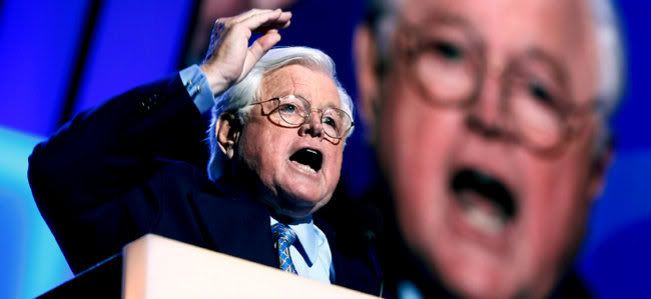Aquino was sick for over a year and passed away Friday. I don't think so many Filipinos have cried together since
Manny Pacquiao's 2005 loss to Erik Morales. But the truth is that tears are being shed unnecessarily for someone who did so much damage to that country.
I'm reminded of that line from "JFK": "They're bawling like they knew the man. Makes me want to puke." It's one thing to weep over someone you actually know, but the vast majority of Filipinos are weeping over someone whose "legacy" is nothing more than a fanciful construction. She was the Philippines' equivalent of Jimmy Carter: a seemingly "nice" person, pleasant in appearance, but incompetent, and forgettable except that she succeeded a completely corrupt president.
The housewife's only "qualification" to seek the Philippine presidency was that her husband, Benigno Aquino, then-president Ferdinand Marcos' chief rival, had been assassinated a few years earlier. It would have been fine had she done no more than lead the
"People Power Revolution" that eventually toppled Marcos, step down disappear into private life.
That would have been a legacy worth remembering, but she believed she could actually wield real power over people.
Her efforts at economic controls did nothing but set back what private progress struggled to achieve in the post-war years. Marcos' attempts to force rapid development were bad enough, taxing the productive (and borrowing from foreigners) to "invest" in his pet projects, but Aquino did much the same thing. Her "land reform" purported to break up the huge lands held by the "oligarchy" and redistribute them to the lower classes, but history had already proven by 1986 the inevitable disastrous results of central planning. Moreover, as oppressive as the wealthiest Filipino landowners have been for centuries (mini-tyrants during Spanish colonial rule, and corrupt today via vote-buying), the "reforms" also targeted honest families who happened to amass more than a few hectares. So this was hardly "taking back from the rich what they stole from the poor."
Her
Executive Order 229 of July 22, 1987 implemented the "Comprehensive Agrarian Reform Program" of her earlier Presidential Proclamation 131. History had already proven the inevitable disastrous results of central planning, but Aquino had promised "agrarian reform," and her administration thought they could devise a way.
Department Administrative Order #3, issued in October 1987, required compulsory registration of lands
and estimated production. The only purpose for a government to know such things is so that it can exercise control; nothing less. It also included the onerous provision: "The citizenry, in general, and farmer's organizations and other non-governmental organizations in particular, will be encouraged to participate in the campaign, particularly in creating social pressurs on those who, intentionally or otherwise, do not register or declare false information."
Then Republic Act 6657, passed on June 10, 1988, applied reforms to
all lands, including privately owned land: the landowner would be "allowed" to keep five hectares (about 12 and a third acres), and each child over 15 who was actively working or managing the land could keep three hectares. The government would let the families choose which sections of the land -- how gracious!
Then there's the price tag, originally set at 50 billion pesos -- approximately U.S. $2.4 billion, a huge amount for such an impoverished country! The money was needed partially for administration, and mainly to "compensate" landowners (hence the registration requirements mentioned above) for what was seized. How did Aquino propose to pay for it? No problem, because her people had a plan:
recipients of the land transfers would have to buy the land outright, via 30-year loans at 6% interest from the government. The government would be making money there, and Aquino's administration figured that any losses could be covered by...foreign aid!
The Philippines still suffers today. Current president Arroyo has her
windmills, and she's destroyed food production by encouraging ethanol: farmers are turning from rice and vegetables to sugarcane, which would otherwise not be as profitable, but now Arroyo's government is giving them money. Is it any wonder that sugar and rice production have gotten worse, forcing the Philippines to import both? It's true: the Philippines must import sugar, and it's the biggest rice
importer among Asian countries. It's not just the growing population, or the lower production compared to American farms with advanced machinery. It's all the government intervention, from "encouraging" less profitable industries to outright property seizure. Similar to Zimbabwe, the government "redistributed" land to those who didn't know the first thing about managing agriculture. Because government placed its own valuations on land, people could no longer make a rational decision between, say, continuing to plant sugarcane or building a house.
Even so, there were ways around the land redistribution. A family could incorporate its holdings and then transfer shares of stock in lieu of giving up actual land. By transferring no more than a minority of the shares outstanding, the family could retain effective control.
Aquino's own family, the powerful Cojuangcos, were the first to use this trick. Suits were filed against them, but the Philippine courts conveniently dismissed the litigation. Meanwhile, the smaller, still-wealthy families had neither the loopholes nor the political connections to preserve their holdings. "Reform," then, was a perfect means for the biggest landowners to drive out their mid-size competitors.
And yet this woman is being remembered, and will probably be remembered for decades to come, as incorruptible and some sort of saint. Unbelievably,
she's been compared to Joan of Arc.
Millions of Filipinos will disagree with this, and they won't want to hear this, but the truth hurts.
Labels: Big government, State worshippers



